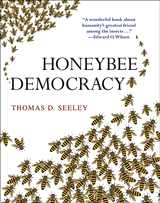In 1980, biologist Thomas Seeley defused a cold war confrontation when he showed that yellow dots in a Thai jungle weren't chemical weapon residues -- they were bee crap. Since then, he's found in bees a significant source of wisdom.
What Seeley and others find so mesmerizing about bees is their apparent capacity to organize themselves, in swarms of around 10,000, without any apparent leadership or direction. How do they know where to settle, and where to start a new colony, without someone to tell them? 
For business leaders, Seeley's answers offers some profound insights and questions. As Seeley describes in his book, HoneyBee Democracy, bees communicate through dancing. But bees can only dance for a few hours. So they have to communicate to others mission-critical information (like where to forage and where to settle) to keep their messages flowing. If that information isn't confirmed, or if it is contradicted, the chain is broken and no decision gets made. So no single message is ever enough for action -- and premature conclusions are structurally impossible.
The advantages of this kind of decision-making are intriguing. Each bee has a simple job but no one bee makes a decision alone. If one makes a mistake, they get back on track fast. New information -- confirmatory or contradictory -- comes in all the time.
Seeley doesn't just research this stuff; he learns from it and applies it, running his Cornell department along the lines of lessons he learned from bees:
1. Interfere as little as possible.
2. Let everyone have a say.
3. Don't make the decision yourself; manage the process.
4. Make final decisions by secret ballot.
The last, of course, isn't what bees do but it may be the most important piece. Because public decision-making, and even brainstorming, suffer hideously from the human need to conform.
Leaders find this lack of direct intervention hard to contemplate. They are mostly action-oriented and have got to the top because they've made a lot of good calls. It's the rare leader who is good at shutting up, listening and encouraging the widest possible contributions. When women attempt this form of leadership, they're invariably labeled 'weak' and thrown out. But then that's the one action bees can't take about their queen.